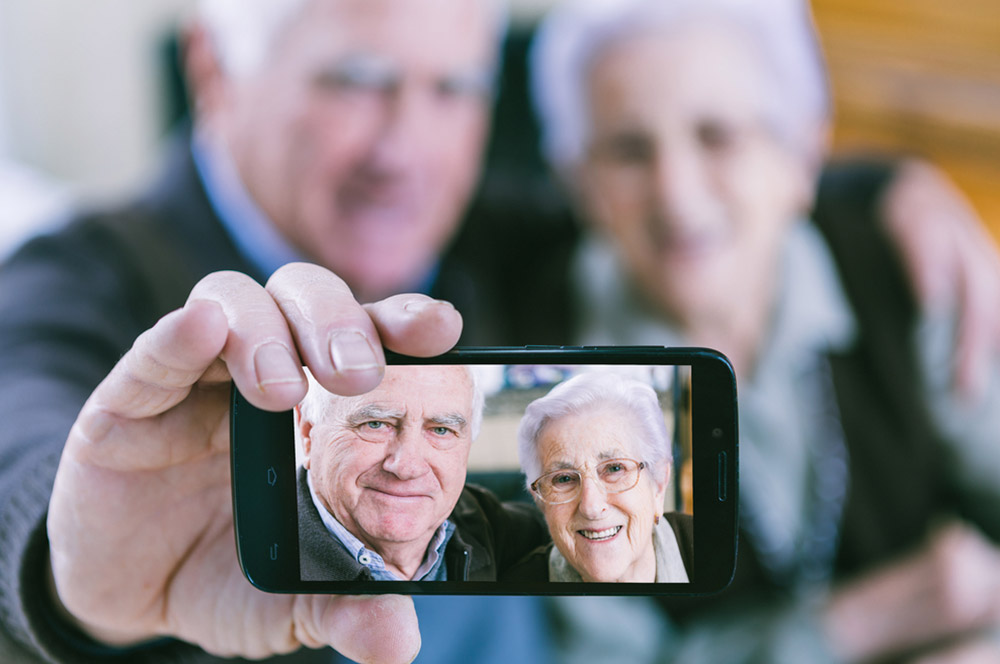In this age of rapidly expanding technology, it can be difficult for even the most tech-savvy people to keep up with important trends. For those of us that are not techies, trying to keep up can seem laughable. The important thing is to keep up at least enough to know how to keep everything safe and secure.
Many senior citizens who did not grow up in a world of technology can struggle to utilize all of these devices for their benefit. Furthermore, they may be failing to properly secure themselves and their devices from others who may have malicious intent. Seniors also may not fully understand the potential risks associated with smart device use in certain situations.
For people responsible for the care of senior loved ones, it is important to take the time to have a meaningful conversation about smart device safety. Making sure older folks understand what it means to have a device that is safe for use, and walking them through the process if they don’t, can be a critical component to their ultimate financial and emotional health. Below are a couple topics worth discussing.
Personal Information Security
Perhaps the most serious of all risks associated with senior citizens using smart devices is the severe lack of awareness about social security scams. Senior citizens without much technological experience are prime targets for scammers and those interested in stealing personal information. They are particularly vulnerable because many do not have the technological background to realize when they are being taken advantage of.
Because of this, it is important to review the potential risks, things they should avoid doing, and what to do if they think they might be getting scammed. Be sure to touch on things such as text message scamming, fraudulent callers, and storing personal information on devices, even within certain apps. Always encourage them to use passwords that are easy to remember, but not too similar to one another.
Smartphones and their associated apps can do a lot to help seniors organize and keep track of information. In some cases they may even provide alerts and notifications that can improve our quality of life and protect us from certain levels of harm. Seniors shouldn’t be discouraged from taking advantage of these potential benefits, but they should be made fully aware of some of the risks associated with putting personal information into apps and devices.
Physical Safety
Physical safety is another issue worth touching on when it comes to smart devices. For instance, it is critical to drive home the message that under no circumstances should smart devices be used while driving.
This “no use while driving” policy applies to any smart device, including watches or GPS systems. Any technology that takes the senior’s attention off the road needs to be kept out of reach while driving. Clarify that for safety purposes, these should only be used prior to leaving for their destination, or once they arrive at it.
Seniors should also be made aware of the potential risks associated with spending a great deal of time looking at a screen. Excessive screen time can lead to a number of problems such as dry, itchy eyes, fatigue, blurry vision, or headaches. One good rule of thumb is to spend at least one minute gazing away from the screen for every 20 minutes looking at it.
A number of apps have been developed that may actually work to lower physical risk to seniors. For instance, many apps work alongside useful home medical equipment such as mobile medical alert systems. A number of new medical devices have associated apps to control them, and many regular appliances do as well. Things such as checking to see who is at the door can now be done from a smartphone app tied to a camera at the door.
Mental Health
Smartphones can also be either a significant benefit or a potential risk to the mental health of senior citizens. Although cell phones have been applauded for their ability to connect people from all walks of life, numerous recent studies have indicated that they can be addicting. Those addicted to their smart devices may struggle from greater anxiety or depression because they are missing out on actual human-to-human interaction.
These risks can be especially profound for seniors with limited mobility who utilize smart devices for the majority of their social interactions. It is important to discuss the risks of smartphone addiction, and to actively encourage social engagement besides for by means of technology. Mental health concerns can be greater during winters, when it is more difficult to get out and see people due to cold weather and poor travel conditions.
Of course, the benefits of being able to more easily connect with family and friends cannot be completely disregarded. The ability to keep in touch with children and grandchildren that may not live nearby is a great gift that many seniors treasure above all others. In moderation, smart devices can provide profound mental health benefits to senior citizens.
***
As your loved ones age, it is important to keep them up to date on important safety issues related to smart devices. Take the time to help them to understand how to identify risks and protect themselves from security threats. Also discuss with them some of the possible physical and mental health risks associated with smart device use.


